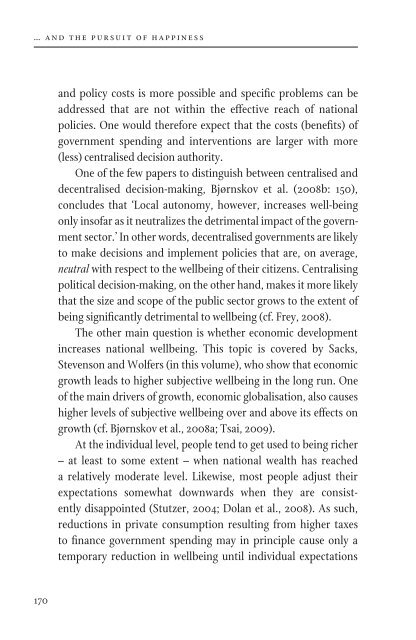… and the Pursuit of Happiness - Institute of Economic Affairs
… and the Pursuit of Happiness - Institute of Economic Affairs
… and the Pursuit of Happiness - Institute of Economic Affairs
You also want an ePaper? Increase the reach of your titles
YUMPU automatically turns print PDFs into web optimized ePapers that Google loves.
<strong>…</strong> <strong>and</strong> <strong>the</strong> pursuit <strong>of</strong> happiness<br />
wellbeing <strong>and</strong> <strong>the</strong> size <strong>of</strong> government<br />
<strong>and</strong> policy costs is more possible <strong>and</strong> specific problems can be<br />
addressed that are not within <strong>the</strong> effective reach <strong>of</strong> national<br />
policies. One would <strong>the</strong>refore expect that <strong>the</strong> costs (benefits) <strong>of</strong><br />
government spending <strong>and</strong> interventions are larger with more<br />
(less) centralised decision authority.<br />
One <strong>of</strong> <strong>the</strong> few papers to distinguish between centralised <strong>and</strong><br />
decentralised decision-making, Bjørnskov et al. (2008b: 150),<br />
concludes that ‘Local autonomy, however, increases well-being<br />
only ins<strong>of</strong>ar as it neutralizes <strong>the</strong> detrimental impact <strong>of</strong> <strong>the</strong> government<br />
sector.’ In o<strong>the</strong>r words, decentralised governments are likely<br />
to make decisions <strong>and</strong> implement policies that are, on average,<br />
neutral with respect to <strong>the</strong> wellbeing <strong>of</strong> <strong>the</strong>ir citizens. Centralising<br />
political decision-making, on <strong>the</strong> o<strong>the</strong>r h<strong>and</strong>, makes it more likely<br />
that <strong>the</strong> size <strong>and</strong> scope <strong>of</strong> <strong>the</strong> public sector grows to <strong>the</strong> extent <strong>of</strong><br />
being significantly detrimental to wellbeing (cf. Frey, 2008).<br />
The o<strong>the</strong>r main question is whe<strong>the</strong>r economic development<br />
increases national wellbeing. This topic is covered by Sacks,<br />
Stevenson <strong>and</strong> Wolfers (in this volume), who show that economic<br />
growth leads to higher subjective wellbeing in <strong>the</strong> long run. One<br />
<strong>of</strong> <strong>the</strong> main drivers <strong>of</strong> growth, economic globalisation, also causes<br />
higher levels <strong>of</strong> subjective wellbeing over <strong>and</strong> above its effects on<br />
growth (cf. Bjørnskov et al., 2008a; Tsai, 2009).<br />
At <strong>the</strong> individual level, people tend to get used to being richer<br />
– at least to some extent – when national wealth has reached<br />
a relatively moderate level. Likewise, most people adjust <strong>the</strong>ir<br />
expectations somewhat downwards when <strong>the</strong>y are consistently<br />
disappointed (Stutzer, 2004; Dolan et al., 2008). As such,<br />
reductions in private consumption resulting from higher taxes<br />
to finance government spending may in principle cause only a<br />
temporary reduction in wellbeing until individual expectations<br />
<strong>and</strong> aspirations have adjusted. In practice, however, Di Tella et al.<br />
(2003) show that people are not likely to adjust <strong>the</strong>ir expectations<br />
fully. Because <strong>of</strong> this, economic growth is likely to lead to higher<br />
wellbeing overall.<br />
The government sector <strong>and</strong> its active role in society could thus<br />
cause losses <strong>of</strong> happiness in <strong>the</strong> long run because <strong>of</strong> its effect on<br />
economic growth. Activist government policies <strong>and</strong> a growing<br />
public sector are likely to undermine both growth <strong>and</strong> globalisation<br />
(e.g. Fölster <strong>and</strong> Henrekson, 2001; Bergh <strong>and</strong> Henrekson,<br />
2011), <strong>and</strong> thus slow down <strong>the</strong> already slow trend towards greater<br />
wellbeing. Given this, <strong>the</strong> apparently popular case for active<br />
government involvement in increasing wellbeing seems misdirected.<br />
As noted above, a number <strong>of</strong> studies find no basis for <strong>the</strong><br />
claim that government spending is positively associated with<br />
happiness. High government spending instead tends to reduce<br />
growth <strong>and</strong> may also be harmful to o<strong>the</strong>r factors contributing to<br />
happiness.<br />
In addition, <strong>the</strong> potentially positive effects <strong>of</strong> material<br />
improvements may be less likely to be visible in <strong>the</strong> wellbeing <strong>of</strong><br />
countries. As a sizeable share <strong>of</strong> <strong>the</strong> population provides answers<br />
that are close to <strong>the</strong> maximum happiness level in survey questions,<br />
<strong>the</strong> inability to place one’s assessment <strong>of</strong> wellbeing higher<br />
than <strong>the</strong> top category <strong>of</strong> <strong>the</strong> questionnaire constrains <strong>the</strong> surveys<br />
at <strong>the</strong> top end, <strong>the</strong>reby making it more difficult to measure <strong>the</strong><br />
real effects <strong>of</strong> improvements within <strong>the</strong> group <strong>of</strong> countries that<br />
already has high levels <strong>of</strong> wellbeing (see Ormerod <strong>and</strong> Johns,<br />
2007; Stevenson <strong>and</strong> Wolfers, 2008). The real effects <strong>of</strong> government<br />
spending in rich democracies may thus be underestimated.<br />
170 171












